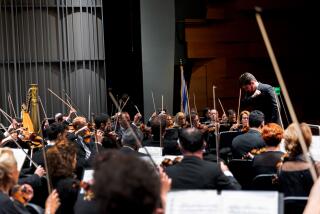Harpsichord Comes Out of the Attic : Music: Igor Kipnis has been touring, lecturing and extolling the virtues of the keyboard instrument for three decades.
- Share via
It has a narrow dynamic range, a clinking timbre and, to many listeners, an arcane, fusty aura. But to Igor Kipnis, the 400-year-old harpsichord’s tinkling tones can still make vibrant music for audiences of today.
Kipnis, a 61-year-old professorial type who has been touring, lecturing and extolling the virtues of the keyboard instrument for three decades, regularly spices programs of the venerables with crossover selections, making him possibly the only harpsichord player ever to pluck out Brubeck or Ellington on an instrument that was important during the 16th through 18th centuries.
“I’ve always played as much repertoire on it as you possibly can,” he says. “So many people think of the instrument as belonging entirely to an ‘attic’ repertoire. It doesn’t only have to play the better-known harpsichord composers--Bach, Handel, Scarlatti, Rameau and Couperin. I take it all the way to the end of the 18th Century, and then all kinds of 20th-Century composers have written for it as a solo, chamber or coloristic instrument with orchestra.”
Thirty years ago when he first lit out for the wide-open spaces of this country to win over listeners, Kipnis transported his red-laquered Rutkowski & Robinette harpsichord inside a Chevrolet Sportvan. It is one measure of the harpsichord’s increasing popularity that he is now able to arrange surrogate instruments of more or less satisfactory quality just about anywhere along his performance trail.
“I have to play as though I am perfectly comfortable on this unknown instrument even though it is the equivalent of driving a car in the Indianapolis 500--and maybe I don’t remember where the brake is.”
The harpsichordist is minding two anniversaries this year--the bicentenary of Mozart’s death, which has increased demand for his Mozart program on fortepiano, the forerunner of the piano, and the centenary of the birth of his father, the great Metropolitan Opera basso Alexander Kipnis.
As part of a cluster of performances in the Los Angeles area this week, he presented an illustrated lecture on his father to the Wagner Society last Saturday (a contract was just signed to co-author a biography of the late singer), performed a Mozart tribute for Fullerton Friends of Music Sunday and taught master classes in San Diego Monday and Tuesday. Tonight, he will play a harpsichord recital at First Congregational Church for the Los Angeles Bach Festival.
Growing up as the son of the great Metropolitan Opera basso probably contributed to his vantage point, as no doubt did playing childhood games under the piano of his maternal grandfather in Chicago, Heniot Levy, a student of composer Max Bruch who turned to teaching because of the pressing needs of feeding a family.
With this family background, it was never stated outright but always understood that music, with its financial uncertainties, was not to be his career. Kipnis earned a Harvard degree not in music but in social relations. After stints as a radio announcer, music reviewer for the New York Herald Tribune and general factotum at various record companies, Kipnis decided to commit himself to the harpsichord in 1959. He recalls his father’s disbelief that he was going to make a career “on an ancient relic.”
Born in Berlin, Igor Kipnis was carried from one operatic capital to another until his parents settled in New York City in 1940. His father sang in Germany as late as 1938, never fearing for his safety because of his great popularity there and because he had taken out American citizenship.
Says Kipnis fils : “One of the fascinating things that came up while I researched the biography is that in 1933, father was in Bayreuth performing at the festival. He was invited by the Wagner family to have dinner and the other guest was to be Adolf Hitler. He turned the invitation down, saying he was otherwise occupied.”
More to Read
The biggest entertainment stories
Get our big stories about Hollywood, film, television, music, arts, culture and more right in your inbox as soon as they publish.
You may occasionally receive promotional content from the Los Angeles Times.










